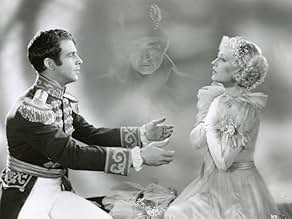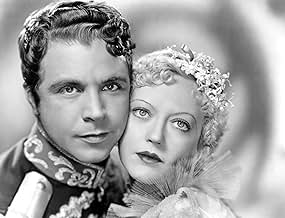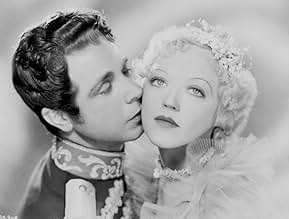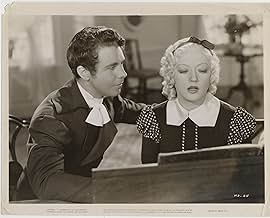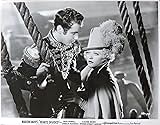Ajouter une intrigue dans votre langueNapoleon needs money to fight his wars in Europe so he wants 20 million dollars for the Louisiana Territory in the United States. To help the negotiations, he sends his brother, Jerome, to t... Tout lireNapoleon needs money to fight his wars in Europe so he wants 20 million dollars for the Louisiana Territory in the United States. To help the negotiations, he sends his brother, Jerome, to the U.S. on a goodwill tour. At a Maryland Horse Track, Jerome shows up without notice and ... Tout lireNapoleon needs money to fight his wars in Europe so he wants 20 million dollars for the Louisiana Territory in the United States. To help the negotiations, he sends his brother, Jerome, to the U.S. on a goodwill tour. At a Maryland Horse Track, Jerome shows up without notice and soon wins an afternoon tour with Betsy. He falls for her, but she will have little to do w... Tout lire
- Réalisation
- Scénario
- Casting principal
- Henry
- (as Charlie Ruggles)
- Pippin
- (as Phillip Hurlic)
- Gabriel
- (non crédité)
- Robert Livingston
- (non crédité)
Avis à la une
The cast was wonderful, the script was meaty for a romantic picture, with some really funny lines, and I enjoyed the sweet romance between the principals, Miss Davies and Dick Powell. Claude Rains was a joy to watch as Napoleon; loved that bathtub scene with his servants scrubbing his manly hairless chest. Sort of like Johnny Rocco (Edward G. Robinson) in "Key Largo", but much funnier.
Special mention goes to character actors Charlie Ruggles, Arthur Treacher, and Edward Everett Horton as would be suitors to Miss Davies; they helped round out the script and bring even more giggles to the story.
I also enjoyed the music, including two pretty tunes by songmeister Harry Warren, and the negro spirituals.
8 out of 10.
This good-natured romance film has been rather harshly criticized as being bad history, which it is, instead of being appreciated for its simple aim to provide some escapist amusement in the form of a lavish movie starring Marion Davies. In this it succeeds. William Randolph Hearst, Davies' powerful lover, saw to that, and what Hearst wanted he generally got. Although the plot is exceedingly silly at times, the film is still a pleasant entertainment.
At 39, Davies was too old for the part (and older than her costar by seven years), but Hearst liked seeing her in the crinoline & lace roles, and she had little control of the matter. However, as was her custom, Marion charms the viewer with her buoyant spirits, willingness to please and genuine acting skills. She's more than able to hold her own with a talented supporting cast and appears quite happy to be in the arms of young Dick Powell. For his part, Powell needs do little more than exude boyish charm and sing a few times to cover his acting requirements quite nicely.
As Napoleon, the great Claude Rains steals every scene he's in by very quietly underplaying his acting and only hinting at the tremendous power his character wields. Fascinating to watch even under heavy makeup, Rains makes a quality contribution to the film.
The movie's humor is largely handled by a trio of excellent character actors. Droll Arthur Treacher, suspicious Edward Everett Horton & grumpy Charles Ruggles play Marion's erstwhile suitors. Constantly trying to upstage each other, their dialogue provides plenty of chuckles.
Even in minor casting the film excels. Dignified Henry Stephenson and sharp-tongued Clara Blandick play Marion's father and aunt. Walter Kingsford & diminutive Etienne Girardot play the French officials assigned to keep an eye on Mr. Powell. Halliwell Hobbes lends gravity to his small role as Napoleon's Second Consul. Beulah Bondi brightens her single scene as the Bonaparte boys' kindhearted mother. And the magnificent Hall Johnson Choir appears to lift its voice in song for a few moments.
Time has not dealt kindly with Marion Davies. Almost forgotten today, when remembered at all it is usually as a sort of footnote to history or object of scandal. Her life certainly was colorful, and as chatelaine of America's most amazing private estate she did circulate amidst powerful circles. But to remember her as the bimbo blonde mistress of the country's mightiest media baron is patently unfair.
While much of the blame can go to Orson Welles' spoof of Davies in CITIZEN KANE (which he was to admit he regretted towards the end of his life) it must be stated emphatically that Marion was not a no-talent actress with few friends & even fewer brains, whose career was destroyed by her stammer leaving her to spend lonely years in great, hulking empty castles.
In reality, Davies was a bright, vivacious lady who charmed & captivated such diverse guests as George Bernard Shaw & Winston Churchill throughout her 33-year liaison with Hearst. Adored by her friends and a fierce cadre of fans, Davies was renowned for her tireless generosity and charitable good works. Her speech impediment never affected her screen acting and her undeniable talent was evident to any who were willing to assess her performances honesty and look past the scandal.
Davies had to have been embarrassed by the Hearst empire's relentless pushing of her career. She knew this left her open to ridicule & mockery, doubtless contributing to her scarcely concealed alcoholism. But she eventually relinquished her film pursuits in order to care for the aging Hearst, and after his death in 1951 she showed herself to be an astute businesswoman during the remaining ten years of her life.
It is only now, with the passage of much time & the restoration of her old movies, that it is becoming easier to acknowledge the contributions & cinematic expertise of Marion Davies.
****************************
Jérôme Bonaparte (1784-1860) was only 16 when he entered the service of Napoleon as a member of the Consular Guard. After being wounded in a duel he transferred to the French Navy. Leaving his ship in the West Indies, he entered the United States, (Jérôme was not involved in the sale of the Louisiana Purchase to America) where he fell in love with Elizabeth Patterson of Baltimore, Maryland. They were married on Christmas Eve, 1803. After returning to Europe with his wife in 1805, it was discovered that Napoleon had annulled the marriage and forbade Elizabeth to enter any of his domains. This decision was absolutely determinate. Elizabeth was returned to America and Jérôme was married to Princess Catherine of Württemberg and subsequently proclaimed King of Westphalia in 1807, which included a wide territory east of the Rhine in addition to the former province of Westphalia. He abdicated in 1813 when Napoleon's powers began to decline, but he continued to serve as a loyal officer fighting for his brother until the Battle of Waterloo brought total defeat in 1815. Jérôme then retired into self-exile and did not return to France until 1847, when he entered the service of his nephew Napoleon III, the son of his brother Louis. Jérôme would eventually serve as Governor of the Invalides, Marshal of France & President of the Senate.
** (out of 4)
Claude Rains masterful performance as Napoleon is wasted in this rather bland mess that was clearly meant to be a showcase for star Marion Davies. In the film, Napoleon sends his brother Bonaparte (Dick Powell) to America where he is to negotiate $20 million for the Louisiana Territory. Once there, he ends up teaching French to the beautiful Elizabeth Patterson (Davies) and eventually falls in love with her, which doesn't sit too well with his brother. It's well known that Davies felt at ease with a good comedy but the costume dramas made her nervous and that's obvious here in this film, which besides a few good things turns out to be a complete mess. Based on true events, the movie changes history around to fit the story so those looking for the truth might want to settle with a book on the subject. Hearst obviously thought Davies could handle the material but she can't and sadly she comes off looking pretty weak her. There wasn't a single scene where I believed her as this character as she didn't look the part nor was she able to act it. Powell, selected by Davies, isn't any better and often just appears to be modeling for the camera. The two of them have absolutely no chemistry together and this really kills the love story trying to be pushed here. The main reason to watch this film is for Rains performance, which is another great one by the character actor. He does a great job at filling the part of Napoleon and one can't help but wish the entire movie be built around him. Rains plays the character quite low but that power (or evilness) is easily viewable just by looking at his eyes. The film isn't helped any by some really silly dialogue or rather lampoonish scenes including one where a group of men follow Davies character up a tree. In the end, there might have been a good story somewhere here but one can't help that the producers didn't find it.
Le saviez-vous
- AnecdotesThere is an outtake of actor Claude Rains, dressed as Napoleon, crying out, "God damn!" taken from this film.
- Citations
Napoleon Bonaparte: Every time you open your mouth the British Navy comes sailing out.
- ConnexionsReferenced in Svengoolie: The Invisible Man (2008)
- Bandes originalesLa Marseillaise
(1792) (uncredited)
Written by Claude Joseph Rouget de Lisle
Played and sung early in the picture
Meilleurs choix
Détails
- Date de sortie
- Pays d’origine
- Langues
- Aussi connu sous le nom de
- Zora slave
- Lieux de tournage
- Sociétés de production
- Voir plus de crédits d'entreprise sur IMDbPro
- Durée
- 1h 27min(87 min)
- Couleur
- Mixage
- Rapport de forme
- 1.37 : 1

